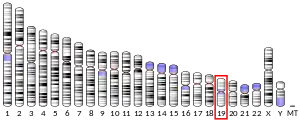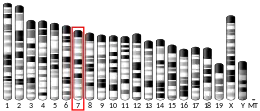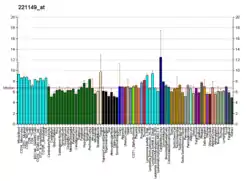C5AR2
C5a anaphylatoxin chemotactic receptor 2 is a protein that in humans is encoded by the C5AR2 gene.[5][6] It's a complement component G protein-coupled receptor, of class A (rhodopsin-like).
Function
The anaphylatoxins C3a, C4a, and C5a are cationic fragments generated during the complement cascade that participate in host defense. In the case of inappropriate complement activation, anaphylatoxins may be involved in autoimmunity and sepsis. C5a2 is coexpressed with the C5a receptor, (C5a1, C5aR, C5R1, CD88), on polymorphonuclear neutrophils and may modulate C5a1 activity.[6][7]
References
- GRCh38: Ensembl release 89: ENSG00000134830 - Ensembl, May 2017
- GRCm38: Ensembl release 89: ENSMUSG00000074361 - Ensembl, May 2017
- "Human PubMed Reference:". National Center for Biotechnology Information, U.S. National Library of Medicine.
- "Mouse PubMed Reference:". National Center for Biotechnology Information, U.S. National Library of Medicine.
- Lee DK, George SR, Cheng R, Nguyen T, Liu Y, Brown M, Lynch KR, O'Dowd BF (Feb 2001). "Identification of four novel human G protein-coupled receptors expressed in the brain". Brain Res Mol Brain Res. 86 (1–2): 13–22. doi:10.1016/S0169-328X(00)00242-4. PMID 11165367.
- "HGNC:4527". Retrieved 2019-08-30.
- Gerard NP, Lu B, Liu P, Craig S, Fujiwara Y, Okinaga S, Gerard C (December 2005). "An anti-inflammatory function for the complement anaphylatoxin C5a-binding protein, C5L2". J. Biol. Chem. 280 (48): 39677–80. doi:10.1074/jbc.C500287200. PMID 16204243.
Further reading
- Klos A, Wende E, Wareham KJ, Monk PN (2013). "International Union of Pharmacology. LXXXVII. Complement peptide C5a, C4a, and C3a receptors". Pharmacol. Rev. 65 (1): 500–43. doi:10.1124/pr.111.005223. PMID 23383423.
- Ohno M, Hirata T, Enomoto M, et al. (2000). "A putative chemoattractant receptor, C5L2, is expressed in granulocyte and immature dendritic cells, but not in mature dendritic cells". Mol. Immunol. 37 (8): 407–12. doi:10.1016/S0161-5890(00)00067-5. PMID 11090875.
- Cain SA, Monk PN (2002). "The orphan receptor C5L2 has high affinity binding sites for complement fragments C5a and C5a des-Arg(74)". J. Biol. Chem. 277 (9): 7165–9. doi:10.1074/jbc.C100714200. PMID 11773063.
- Strausberg RL, Feingold EA, Grouse LH, et al. (2003). "Generation and initial analysis of more than 15,000 full-length human and mouse cDNA sequences". Proc. Natl. Acad. Sci. U.S.A. 99 (26): 16899–903. Bibcode:2002PNAS...9916899M. doi:10.1073/pnas.242603899. PMC 139241. PMID 12477932.
- Kalant D, Cain SA, Maslowska M, et al. (2003). "The chemoattractant receptor-like protein C5L2 binds the C3a des-Arg77/acylation-stimulating protein". J. Biol. Chem. 278 (13): 11123–9. doi:10.1074/jbc.M206169200. PMID 12540846.
- Otto M, Hawlisch H, Monk PN, et al. (2004). "C5a mutants are potent antagonists of the C5a receptor (CD88) and of C5L2: position 69 is the locus that determines agonism or antagonism". J. Biol. Chem. 279 (1): 142–51. doi:10.1074/jbc.M310078200. PMID 14570896.
- Gerhard DS, Wagner L, Feingold EA, et al. (2004). "The Status, Quality, and Expansion of the NIH Full-Length cDNA Project: The Mammalian Gene Collection (MGC)". Genome Res. 14 (10B): 2121–7. doi:10.1101/gr.2596504. PMC 528928. PMID 15489334.
- Huber-Lang M, Sarma JV, Rittirsch D, et al. (2005). "Changes in the novel orphan, C5a receptor (C5L2), during experimental sepsis and sepsis in humans". J. Immunol. 174 (2): 1104–10. doi:10.4049/jimmunol.174.2.1104. PMID 15634936.
- Kalant D, MacLaren R, Cui W, et al. (2005). "C5L2 is a functional receptor for acylation-stimulating protein". J. Biol. Chem. 280 (25): 23936–44. doi:10.1074/jbc.M406921200. PMID 15833747.
- Johswich K, Martin M, Thalmann J, et al. (2007). "Ligand specificity of the anaphylatoxin C5L2 receptor and its regulation on myeloid and epithelial cell lines". J. Biol. Chem. 281 (51): 39088–95. doi:10.1074/jbc.M609734200. PMID 17068344.
- Scola AM, Higginbottom A, Partridge LJ, et al. (2007). "The Role of the N-terminal Domain of the Complement Fragment Receptor C5L2 in Ligand Binding". J. Biol. Chem. 282 (6): 3664–71. doi:10.1074/jbc.M609178200. PMC 2873560. PMID 17158873.
External links
- "Complement Peptide Receptors: C5a2". IUPHAR Database of Receptors and Ion Channels. International Union of Basic and Clinical Pharmacology.
This article incorporates text from the United States National Library of Medicine, which is in the public domain.
This article is issued from Wikipedia. The text is licensed under Creative Commons - Attribution - Sharealike. Additional terms may apply for the media files.




